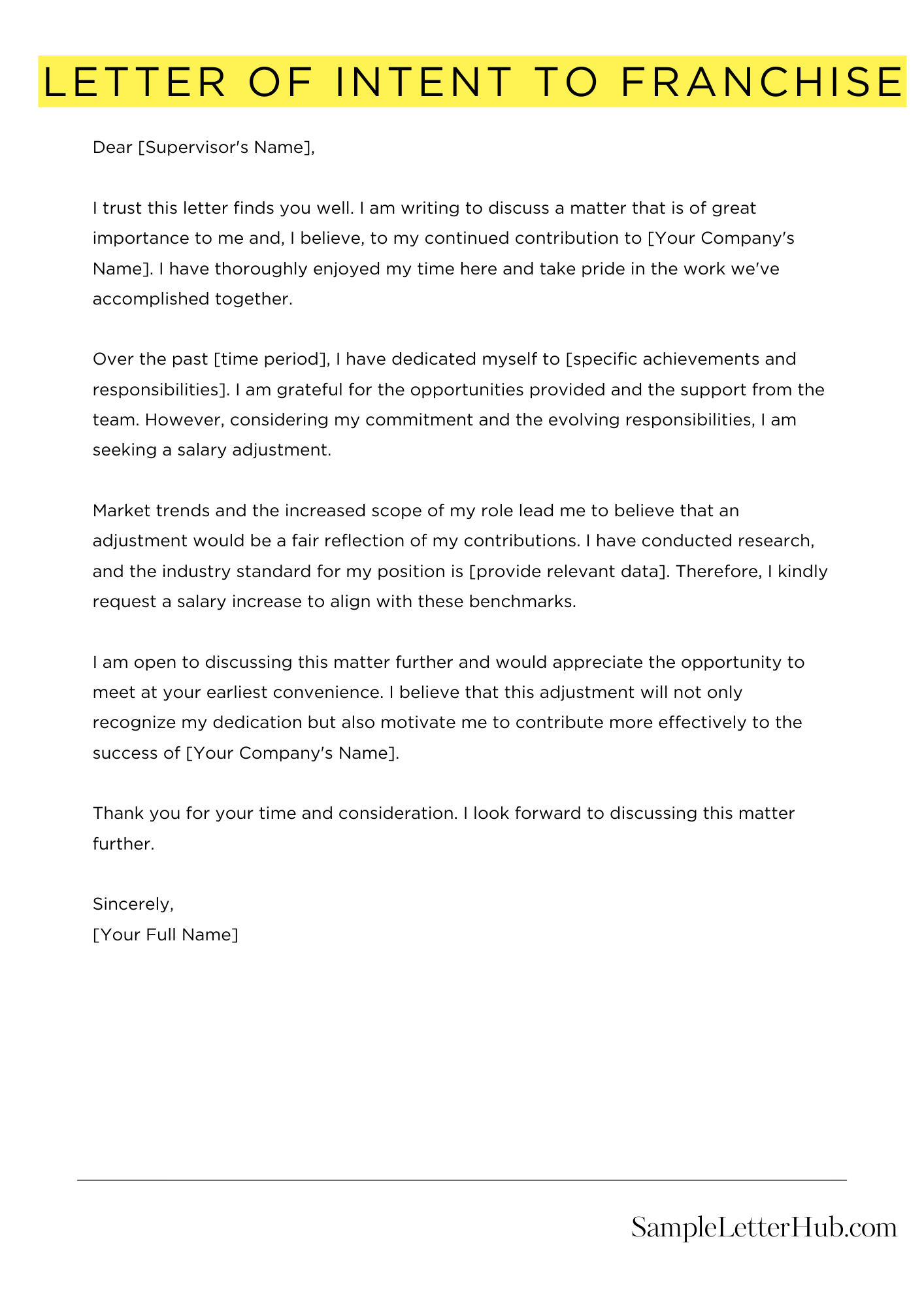

A Letter of Intent to Franchise is a non-binding document that outlines the basic terms of a franchise agreement. It is used to express the interest of both the franchisor and the franchisee in entering into a franchise relationship. The letter of intent is not a legally binding contract, but it does serve as a starting point for negotiations.
In this article, we will share templates, examples, and samples of Letters of Intent to Franchise. These documents will provide you with a starting point for drafting your own letter of intent. We will also provide tips on how to write a strong letter of intent that will increase your chances of success in franchising.
By using our templates, examples, and samples, you can save time and ensure that your Letter of Intent to Franchise is well-written and professional.
Dear [Franchise Company Contact Person],
I am writing to express my interest in franchising with your esteemed organization, [Franchise Company Name]. I have been following your company’s success with great admiration and believe that my skills and experience align perfectly with your franchise model.
I have conducted thorough research on your franchise system and am impressed by its proven track record, strong brand recognition, and comprehensive support network. I am particularly drawn to your commitment to providing franchisees with the necessary tools and guidance to succeed.
With my extensive background in [relevant industry or business experience], I possess a deep understanding of the industry and the key drivers of success. I have a proven ability to manage operations, develop and execute marketing strategies, and build strong customer relationships.
I am confident that I can leverage my skills and experience to establish a thriving franchise location within your network. I am a highly motivated and results-oriented individual with a strong work ethic and a passion for delivering exceptional customer service.
I am eager to learn more about your franchise opportunities and explore the potential for a mutually beneficial partnership. I would welcome the opportunity to schedule a meeting with you to discuss my qualifications and how I can contribute to the success of your franchise system.
Thank you for your time and consideration. I look forward to hearing from you soon.
Sincerely,
[Your Name]

A letter of intent (LOI) is a non-binding agreement that outlines the basic terms of a proposed franchise agreement. It is typically used to express interest in a franchise opportunity and to begin the negotiation process.
The introduction of your LOI should include the following information:
In the statement of interest, you should express your interest in the franchise opportunity and explain why you believe you would be a good fit for the franchise system.
In the qualifications section, you should list your relevant experience, skills, and qualifications. This information will help the franchisor assess your ability to operate a successful franchise.
If you have already identified a potential location for your franchise, you should include this information in the LOI. The franchisor will want to know where you plan to operate your franchise and whether the location meets the franchise’s requirements.
The financial information section should include your financial statements and a projection of your expected financial performance. This information will help the franchisor assess your financial ability to operate a franchise.
The legal considerations section should include any legal issues that may affect the franchise agreement. This may include issues such as zoning, environmental regulations, and intellectual property rights.
The conclusion of your LOI should reiterate your interest in the franchise opportunity and express your hope that the franchisor will consider your application.
A Letter of Intent (LOI) to Franchise is a non-binding agreement between a franchisor and a potential franchisee that outlines the terms of a future franchise agreement. It is a preliminary step in the franchising process and serves to protect both parties by establishing their expectations and intentions.
An LOI to Franchise typically includes the following key elements:
The purpose of an LOI to Franchise is to:
An LOI to Franchise should be used when both the franchisor and the potential franchisee have a serious interest in entering into a franchise agreement but need to further define the terms and conditions of the relationship.
The benefits of using an LOI to Franchise include: